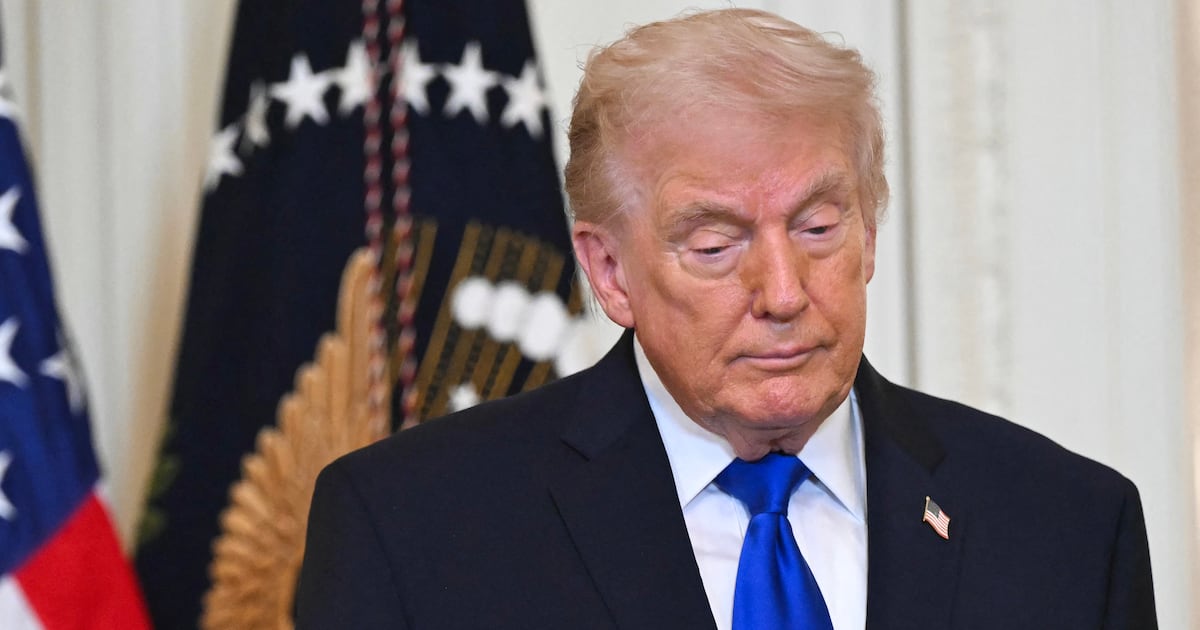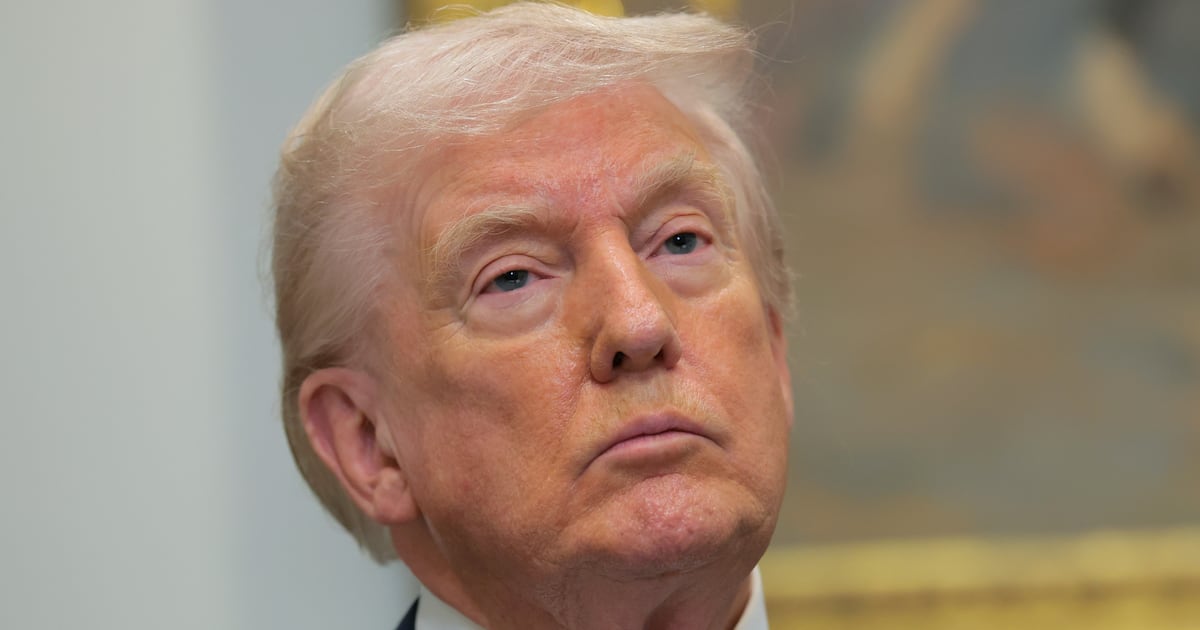With any luck, Donald Trump’s bigotry, demagoguery and all-around unsuitability for high office will eventually prevent him from becoming president. But he may face an even bigger obstacle: His money, or lack thereof.
Strange as it sounds, Trump doesn’t have the money necessary to run a successful general election campaign against the Democratic nominee. And as I’ll explain, he has nowhere to get that money.
Already, Trump is thinly resourced against Ted Cruz, who has invested in a field organization that may give him enough wins to deny Trump a first-ballot victory at the Cleveland convention. Trump does have enough dough to close the spending gap with Cruz, but so far he’s seen no reason to spend it.
Discussions of money are out of fashion in politics, and with good reason. Jeb Bush blew through $130 million and all he got was a lousy T-shirt with an exclamation point. Marco Rubio has gone nowhere despite tens of millions in Super PAC support. The 2016 also-rans have proved once again what those of us who covered such well-funded candidates as John Connally, Phil Gramm, Pierre du Pont, Steve Forbes, and Rudy Giuliani learned a long time ago: Money is more important in state and local races than in presidential campaigns, which are dominated for much of the season by “free media” coverage (debates, news) and the momentum created by it.
The campaign so far has simultaneously reinforced and scrambled that point. Trump’s self-styled pluto-populism and claim that he’s self-funded have been important parts of the pitch. Interviews with voters show that “he can’t be bought” is right up there with “he’s not politically correct” and “he tells it like it is” in explaining his appeal.
Notice how you hear a lot less talk about Super PACs these days, unless it’s Bernie Sanders railing against them. Republican candidates who once reveled in their support from billionaires now cower in silence as Trump attacks them as tools of donors and lobbyists. It’s hard to believe that less than a year ago a stream of candidates went to kiss the ring of Sheldon Adelson. Now Adelson, the Koch brothers et al have indicated that if Trump is the nominee, they’ll be on the sidelines or concentrating on down-ballot Republican candidates.
But none of this matters, you say, because Trump can self-finance, right? Or get the money from his fervent supporters? Wrong and wrong.
Let’s take a quick look at what’s involved in financing general election presidential campaigns, which from Watergate until Barack Obama opted out of public financing in 2008 were largely funded by the one-dollar voluntary check off on tax returns.
Like primaries, general elections are dominated by free media. Swings in polls are often related to external events or changes in momentum. But the field of battle is much bigger and more expensive to play on—around 125 million to 130 million voters in November compared to 25 million to 30 million in contested primaries. Even as spending in the general is mostly limited to a dozen or so battleground states, the money needed to be competitive has risen sharply.
That’s because recent presidential contests have been “mobilization elections” more than “persuasion elections.” In other words, they’re about turnout rather than using free and paid media to convince a dwindling number of undecided voters to come to one side. This is especially the case because of the need to harvest millions of early voters, who vote well before Election Day and increasingly dominate in many states. So hard-core Trumpists won’t be enough. To win, Trump would need to pull more lightly committed voters to the polls in numbers that dwarf the total numbers who voted for him in the primaries, not to mention the total of all cable news viewers.
Building a get-out-the-vote organization that uses sophisticated micro-targeting and newfangled multi-platform advertising is costly. And traditional (and very expensive) ways of reaching voters cannot yet be discarded. When strapped candidates in recent cycles “went dark” (pulled broadcast TV ads) in various states, they almost invariably tumbled in polls.
In 2012, Obama became the first candidate to break the $1 billion barrier (he raised more than $1.2 billion altogether), while Mitt Romney spent about $850 million. Unlike presidential primaries and state and local races, where the biggest spender doesn’t always win, the general election presidential candidate with the most money has won every contest in recent history, with the possible exception of 2000 (for reasons involving calculations of labor spending too boring to explain).
Taking a cue from Obama’s state-of-the-art 2012 campaign, Hillary Clinton has figured all along that she, too, would need more than $1 billion to be elected. So far, she’s raised about $200 million, with another $60 million or so coming from Super PACs. If the 2012 Obama campaign is any indication, that’s on track to meet her goal.
And Trump? As of the Feb. 20 FEC filing, he had raised $27.3 million, about the same as John Kasich. Of that, he had lent his campaign $8 million and raised $4 million in small donations from 74,000 supporters. Trump’s claim on the stump that he doesn’t have a Super PAC is just another lie. The wealthy family of his son-in-law, Jared Kushner, started one that has raised $1.8 million.
Trump’s argument is: Why spend unnecessarily? He has no pollster, few ads, and a small field organization. He builds momentum with big rallies and a brilliant understanding—born of 40 years experience—of how to manipulate the media with an outrageous and constantly changing storyline.
This has worked well so far but as Trump’s act wears thin, he will need money to stay competitive on the ground—especially because he plans to expand the battlefield by running hard in traditionally blue states like Wisconsin, Pennsylvania, and (Trump insists) New York.
If Trump is as rich as he claims, this would be no problem. When he announced for president last June, he said he was worth $8.7 billion. In November, when he released financial statements showing a 2014 income of $362 million, he upped his net worth in a press release to $10 billion. If true (and he still refuses to release any tax returns that would prove his boasts), devoting just a tenth of his fortune to a presidential campaign would be plenty to make him competitive.
But by Trump’s own reckoning, $3.3 billion of his net worth comes from real estate licensing fees, which are only part of his non-liquid assets. Forbes last year downgraded its estimates of his fortune to $4 billion, which if accurate would mean that—minus licensing fees—Trump would need to liquidate almost all of his remaining pile to make the race competitive financially.
Some estimates suggest Trump is actually much less wealthy than that. Former New York Times reporter Timothy O’Brien wrote a well-researched book about Trump that a decade ago estimated his net worth at only $150- $250 million. Trump sued. In a 2006 deposition, Trump was asked under oath what his net worth was. “I would say it’s my general attitude at the time the question may be asked,” Trump said. “And as I say, it varies.” Trump lost his suit, and he later lost a boatload in the 2008 recession before recovering some in recent years.
Let’s give Trump the benefit of the doubt and say he could give around $100 million to his own campaign. But would he? So far he has given exactly nothing, and he lent only a comparative pittance that could easily be covered by other contributions. And that $100 million wouldn’t be enough to make a difference against Hillary’s $1 billion. The RNC, by the way, is mostly a shell and raises relatively little for its presidential candidate outside of that candidate’s own war chest and supportive PACs.
If Trump is nominated, he will no doubt ask his supporters to step up and contribute more. But he would need 10 to 20 times as many small donors as he currently has to reach the number who contributed to Obama. And it takes money to raise money. Obama spent $250 million on a digital campaign partly aimed at generating such small donations.
Even with his small donor success (now also enjoyed by Bernie Sanders), Obama in 2012 still relied on big donors for more than half of his take. So will Clinton. A longtime believer in donor maintenance, she’s well-positioned to keep raking it in from heavy-hitters.
Trump doesn't have that luxury. He bragged at the March 10 debate in Miami that lots of donors had been trying to give him money and he has refused it so far, but might change his mind in the general.
Translation: After he’s nominated, Trump would try to cut deals for big donations from the same lobbyists and billionaires he’s been bashing. While his hardcore supporters might overlook this flagrant hypocrisy, he will still be far short of what he needs. Corporate PACs won’t contribute much—he’s far too controversial among their customers. And wealthy new supporters like Carl Icahn and T. Boone Pickens are unlikely to be good for Adelson-size donations, especially since Trump himself is too poor or cheap to pony up on his own behalf. It would take 200 plutocrats at $1 million a pop to make a difference—a goal that Mitt Romney didn’t come close to achieving. Romney and others mostly built their war chests the old-fashioned way—trooping to endless fundraisers beginning two years before the election. Trump might raise $100 million or so that way but it won’t be easy or nearly enough. Barron’s reported last week that large numbers of Wall Street Republicans are planning to hold their noses and vote for Clinton. Those who back Trump will likely do so reluctantly and without their checkbooks.
All of this means that if he’s the nominee, Donald Trump is likely to be outspent this fall by 2:1, 3:1, 4:1 or more. After four bankruptcies, he should know what happens in a competitive market when you’re badly under-capitalized.






